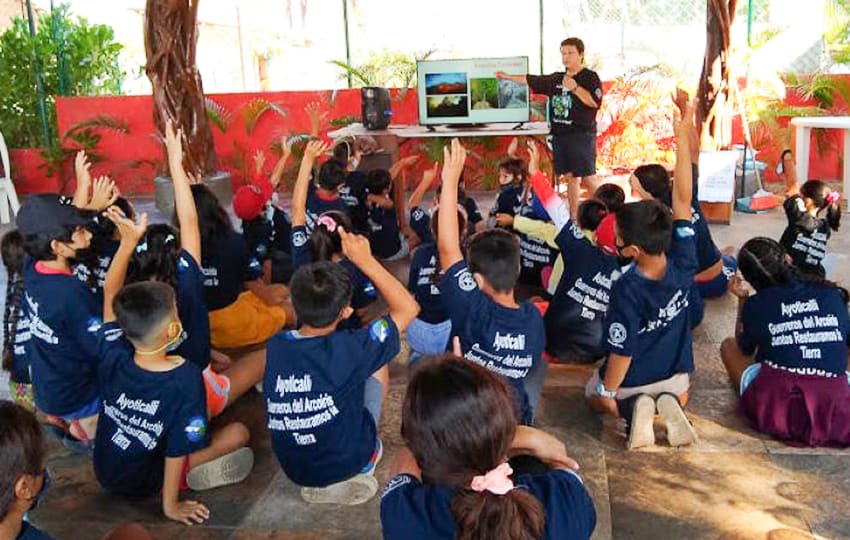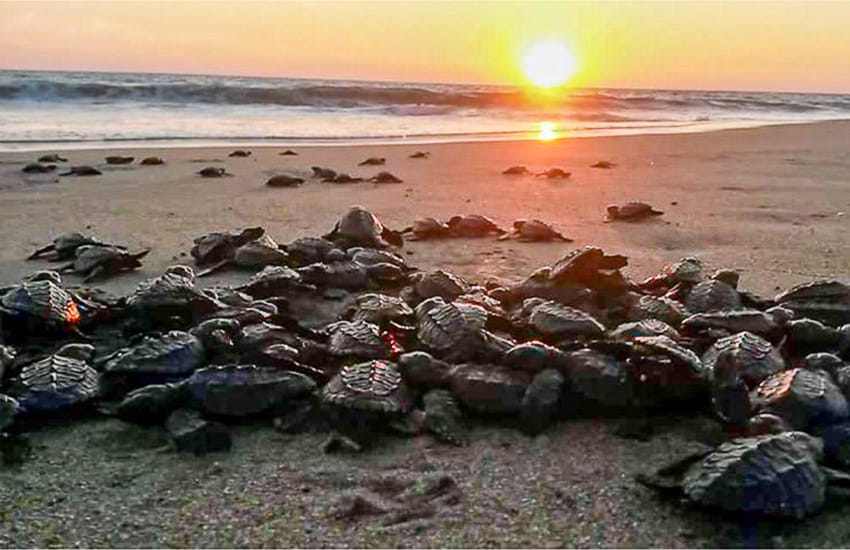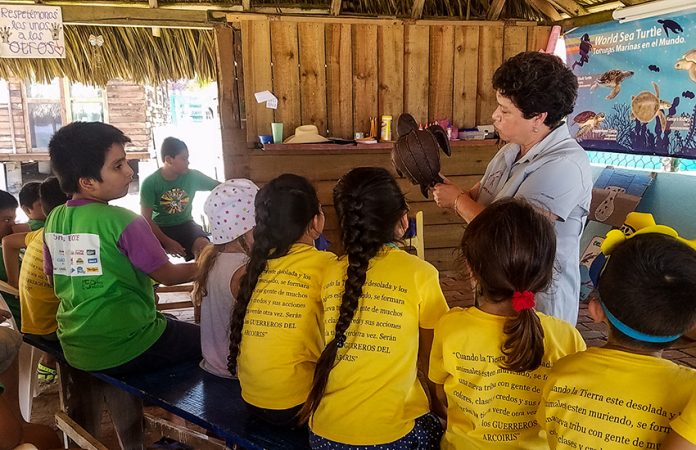One of the most eco-conscious organizations in the Zihuatanejo area is the Campamento Tortuguero Ayotlcali, founded in 2011 by Gene and Damaris Marin-Smith for the preservation of three endangered species of marine turtles.
Specifically, these species that nest in the area of Playa Larga, Playa Blanca and Barra de Potosí are olive ridley, black turtle and the largest marine turtle in the world, the leatherback (dermochelys coriacea).
Turtles, like all creatures, have many natural predators, but perhaps the most dangerous of all is man.
For this reason, locals, national and international volunteers begin their patrols in the rainy season to build corrals and incubators for the turtles along the beaches. Nightly and in shifts of two, these dedicated volunteers patrol the 15 kilometers of coast on ATVs in search of sea turtle tracks, an indication of nesting activity. They plan in the near future to allow interested tourists the opportunity to ride along and experience a patrol for a cost of US $25 per person.
The patrols give the turtles a better chance of survival as currently only about one out of 1,000 survive. Volunteers collect data on how many eggs and even turtles themselves have been stolen by poachers. Last year, for example, 13 turtles were recorded missing in this way. If you figure that the average turtle lays 13,000 eggs each year for 25 years, one turtle gone missing equates to over 325,000 hatchlings not born.
The volunteers move the eggs from the nest and carefully record the data for future use. This data includes species, coordinates, time and number of eggs, among other details. The tracking is an invaluable source of information for future reports.

If a nesting female is present, a pair of tags are attached to the front two flippers in order to track returning females and their frequency.
Once the hatchlings emerge in 45–70 days, depending on species and temperature, they are immediately released a few meters from the ocean. In this way, the hatchlings memorize the sand they were born on and later return to the same beach where they hatched.
The center also has several educational programs in place that reach not only the local level but also the state and the world beyond. As former educators, the Marin-Smiths and their volunteers count on these programs to create the awareness needed to ensure the turtles’ survival.
One of these programs is their annual summer camp, which will run this summer starting in July. The Guerreros del Arcoiris (Warriors of the Rainbow) program, geared for children aged 7–12, integrates reading, writing, math, sciences and fine arts, as well as hands-on activities in environmental issues affecting the children’s community.
This program would not work without the collaboration of many, including expats who over the years have provided time and money and, of course, locals who volunteer one or two nights a week.
The center also held a popular Earth Day commemoration on April 22. Scores of children and volunteers from local communities gathered to learn, create art, and brainstorm ideas on how to encourage the world to be more environmentally conscious. In particular, the discussions included topics around the turtles, pollution in the ocean and ways to combat it and the preservation of marine life.

The center also hosts short-term volunteer opportunities for people both from Mexico and countries around the world. Volunteers can be housed onsite if need be, sometimes for a nominal fee to offset the cost.
There is also an Adopt-A-Nest program where for $50, you receive GPS coordinates to track your nest as well as the names of the volunteers that found it, plus updates on the number of hatchlings. If possible, they will even send you pictures of the animals’ release. Due to high demand and the limited number of nests, you may share the nest adoption with other people.
Campamento Tortuguero Ayotlcali works with other organizations like the local and equally known Whales Of Guerrero, headquartered in Barra de Potosí, and Salvemos de las Isla Ixtapa, which preserves the Hawksbill sea turtle, which lays its eggs on Ixtapa Island. They are also members of the Red Laud OPO, an international organization that focuses on the protection of leatherbacks along the eastern Pacific.
The organization also has other connections, receiving grants from the National Oceanic and Atmospheric Administration, the State of the World Sea Turtles organization Fundación Ecológica Biomar, which funds several activities and essential materials.
During the season the camp is open to visitors to watch the release of hatchlings at 5 p.m. nearly every day. Reservations are required.
Visit their website or Facebook page, take a virtual video tour or call them at 755 121 1021 for further information on how to visit the center or get involved in their upcoming ecotourism tours.
The writer divides her time between Canada and Zihuatanejo.
